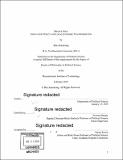Brass cities : Innovation policy and local economic transformation
Author(s)
Armstrong, Ben(Ben David)(Scientist in political science)Massachusetts Institute of Technology.
Download1119723225-MIT.pdf (21.45Mb)
Other Contributors
Massachusetts Institute of Technology. Department of Political Science.
Advisor
Suzanne Berger.
Terms of use
Metadata
Show full item recordAbstract
How have some former industrial cities become hubs for high-wage jobs while others continue to grapple with economic stagnation? This dissertation aims to show how government interventions have shaped U.S. cities' paths to income and employment growth. In the 1980s, nearly every state government in the U.S. began investing in innovation policies aimed at diversifying local economies and stimulating the growth of high-technology industries. Three political obstacles short-term electoral incentives, industry capture, and barriers to collective action - have made the implementation of these policies difficult. Case studies of U.S. cities illustrate how state innovation policies have the potential to overcome these obstacles and transform local economies adapting to the decline of manufacturing. Two pairs of cities - Pittsburgh, PA and Cleveland, OH; Albany, NY and Rochester, NY - had similar economic prospects in the early 1980s, but have followed different economic trajectories in the decades since. In Pittsburgh and Albany national leaders in income and employment growth - the state government played the role of coalition builder, convening local coalitions to identify promising innovation initiatives and monitoring local coalitions as they implemented the initiatives. In Cleveland and Rochester, where income and employment growth has been comparatively low, pre-existing local coalitions and powerful incumbent industries crowded out a potential role for the state government. The model of state government intervention that emerges from this research suggests that convening local actors with economic incentives can overcome barriers to collective action and empower new actors - particularly universities - to implement economic development initiatives in the long term. Monitoring can help avoid policy capture by local interests and amplify the initiatives that showed the most potential. Forming local economic coalitions in this model depends on local actors (e.g. universities, firms) identifying regional economic development goals as institutional priorities.
Description
Thesis: Ph. D., Massachusetts Institute of Technology, Department of Political Science, 2019 Cataloged from PDF version of thesis. Includes bibliographical references (pages 285-314).
Date issued
2019Department
Massachusetts Institute of Technology. Department of Political SciencePublisher
Massachusetts Institute of Technology
Keywords
Political Science.